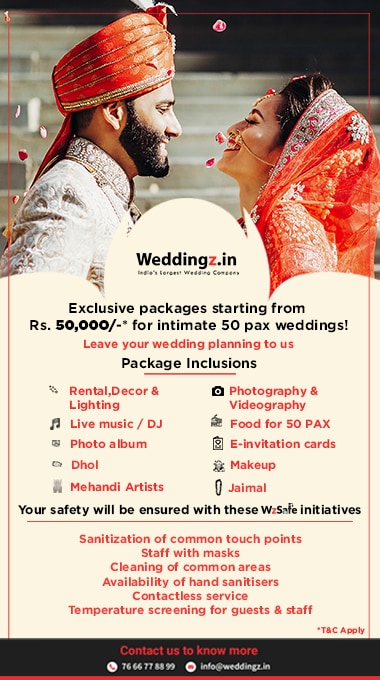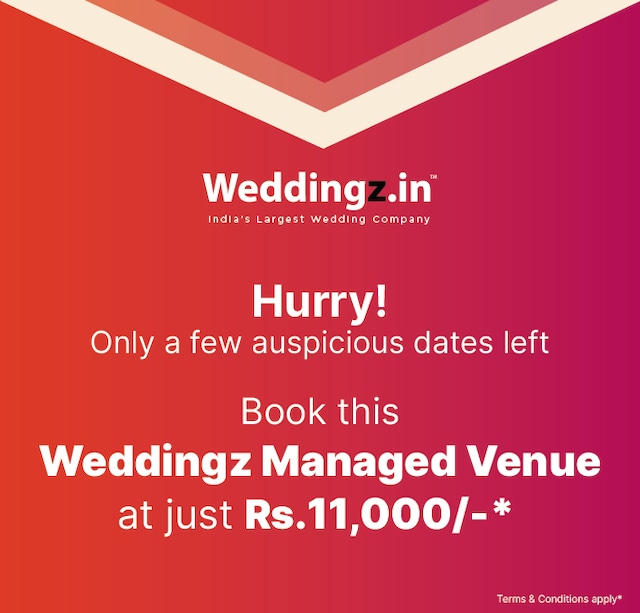Weddingz Safety Guidelines for Hosting Weddings Amidst and Post COVID-19
The COVID-19 Pandemic has presented us with an unprecedented situation creating unique circumstances beyond our imagination. As a global epidemic that has taken over the world and as community transfer of the virus continues to play a major role, it is our top priority to ensure health and safety for all those associated with us and for everyone around us.
Over the past 90 days, our nation has adhered to and followed a strict lockdown. However, as there are signs of reopening and restarting many businesses, as India’s largest wedding company and as industry leaders, we must set strict precautionary measures and norms.
Therefore, we, at Weddingz, have put together a comprehensive guideline on how to improve hygiene, maintaining the highest levels of safety and health for our customers and colleagues alike. We have tried our best to incorporate and adhere to all norms and requirements as required by the Ministry of Health & Family Welfare, the WHO and the FSSA of India.
With this, we present to you the ‘new normal’ until the pandemic situation improves across the world. As the situation continues to evolve each day, our guidelines will continue to evolve and incorporate as per the new requirements.
1. Larger Venues for Fewer Guests
<50% of the regular seating capacity is to be allowed at any particular point of time. Hence, larger venues are preferred as they allow more space for guests to move around without overcrowding.
Given the current circumstances, venue owners should invest in: Automatic doors
Automatic sanitizer dispensers
CCTV Cameras
Intercoms
Walkie-talkies
2. Outdoor Venues vs Indoor Venues
For hosting events amidst the pandemic, venues preferred should be:
Open-air venues are best suited currently since they offer better ventilation and air-flow
In a closed/indoor venue, the centralised air conditioning may hinder fresh air flow, thereby contaminating the air
However, if an indoor ballroom or banquet hall is used, a fresh air system needs to be installed for ensuring air purification
3. Pre-event Sanitisation of the Venue
All furnishings at the venue – chairs, sofas, their seat covers, carpets and rugs are to be washed with M.A.D (Microbial Aerial Disinfection) before every event.
Cleaning of the following areas should be done as per government directives:
Lobbies, corridors, staircases, escalators, elevators, security guard cabins/booths, office rooms, meeting and conference rooms, cafeteria, etc. should be wiped clean with disinfectant with 1% sodium hypochlorite or phenolic disinfectants
High focus contact surfaces like elevator buttons, handrails/handles and call buttons, public counters, reception counters, lobby tables, intercom systems, telephones, etc. should be wiped and cleaned twice daily by a linen/cloth soaked in 1% sodium hypochlorite
Frequently touched areas like tabletops, chair handles, tea/coffee dispensing machines etc. should specially be cleaned similarly
For metallic surfaces like door handles, security locks, keys etc. sanitisers with 70% alcohol can be used to wipe down surfaces where the use of bleach is not suitable

When cleaning, the housekeeping staff should:
Wear Personal Protective Equipment (PPE) before entering the designated area for cleaning and wear it throughout the cleaning process
Discard the masks and gloves, headgear, etc. once the cleaning is over in a designated bin
Wash their hands using soap or a sanitizer immediately after cleaning
#4 ‘Un’Group Photography

At such a time, it is best to avoid group pictures. If not possible, getting clicked in small groups of 4-5 people while avoiding physical contact with one another is a good idea.
#5 Carry Hand Sanitizer
Yes, while hand sanitizers will be provided at the venue, it is important to keep one handy as well. Guests need to use it when getting out of the car. The moment they reach the venue, they need to sanitize their hands with a hand sanitizer that has at least 70% by volume isopropyl alcohol or wash them thoroughly with soap and water. In the case where a hand sanitizer is not available, the spirit that is used before injections can be used, as it also contains isopropyl alcohol.
Guidelines for Hosts
#1 Maintaining Social Distancing
At the event, the host and staff members need to ensure that guests maintain a minimum distance of six feet between each other.
#2 CCTV Monitoring
As the host of the event, one can monitor guests via CCTV cameras and the seating map will very helpful. In case the venue doesn’t have it or it is an outdoor venue, it should be put up as part of the decor requirements.
Please note: A detailed map of the guest seating arrangement should be given to the venue/ event manager.
#3 Virtual Streaming
Virtual streaming devices should be set up, and a Wi-Fi connection should be arranged before-hand so that the celebrations can be streamed virtually as they happen with extended family and friends as they cannot attend the wedding physically.
#4 Rotational Guest Entry
In order to reinforce the social distancing norm and avoid crowding, guests can be invited on a rotational attendance basis, i.e., time slots can be mutually agreed upon for guests to participate in the wedding for a couple of hours each.
#5 RSVP for Attendance
As the number of guests is limited, an RSVP request needs to be added in the invite. Through this, the host will know how many guests are actually attending the event or wedding. Additionally, guests’ location (where they are travelling from and to) should be mapped. A record of their means of transportation used should be recorded as well.
This is because, in case of untoward events, people can be located as per mapping and contact can be traced.
#6 Decor Elements for the Event
The décor elements at the wedding should be such that guests or hosts can move about without touching it.
Guidelines for Venues
#1 Venue Capacity for Guests
Given the current circumstances, larger venues are preferable to accommodate fewer guests, i.e., <50% of the normal standing capacity is to be allowed.
#2 Type of Venue Preferred
Larger venues will help maintain a safe distance between participants. Open-air venues are preferable as they offer better ventilation than closed areas or banquet halls. Open-air venues are preferable with well-spaced out table-chair arrangements. This is important for proper ventilation, fresh air and maintaining distance among guests.
In the case of indoor ballrooms or banquet halls, fresh air system should be turned on every 30 minutes to ensure good ventilation.
#3 Cleaning of Furnishings and Seating Arrangements
All chairs, sofas and seat covers to be changed and cleaned – washed and treated with M.A.D (Microbial Aerial Disinfection) before every event. The same stands true for all carpets and rugs used across the venue. This process should be mandatory before every event as it will help maintain high standards of sanitisation to reduce potential spread across events.
A. Guest Seating and Spaced-out Table Arrangements
An ideal table setting would be to have a round table with 4 guests to a table. Further, these round tables should be placed 6 feet apart from each other. If U-shaped tables or rectangular tables are used, they can seat 4 or more guests each.
Plus, every dinner table to have hand sanitizers and tissue papers for guests.
B. Mapping Guests Locations
For the seating arrangement, it would be best to take a map of every guests’ seating location. This helps to know where someone is sitting and makes it easy to monitor via CCTV.
#4 New Norms for Food & Catering Services
A very important aspect of weddings, catering and food service will be supervised with extra caution. So, tweaking the buffet-style service, using widely spread tables to discourage crowding, with only vendor staff to touch any service utensils, is a good idea.
At the buffet, caterers should provide staff who serve guests the food so that no one else apart from the designated server touches the ladles. If not possible, then the guests will have to use a wet tissue or napkin to hold the ladle while taking servings of food.
At the buffet spread, dishes need to be kept at safe distances, i.e. at least 6 feet apart from each other and guests should be asked to queue up twos and threes. Floor markings made 6 feet apart will help in maintaining a proper queue. In this way, they can avoid bumping into each other.
Food Preparation Should Incorporate the Following:
All vegetables should be washed with hot water with a dash of soda bicarb
All food items to be maintained at an appropriate temperature
Properly cooked food to be served and no raw foods or salads
Using disposable material wherever feasible (plates, glasses, spoons, etc.)
Daily deep cleaning of the kitchen using detergents and disinfectants, steam pressure jets, etc.
Work tops used for cutting, chopping and cooking food to be sanitized using chlorine solution and to be air-dried
#5 Rules for Venue Staff Members
All staff members catering to the guests at the venue must wear headgear/chef hats, gloves and masks at all times. Staff should be stationed at the entry and exit points to open and shut doors for guests, offering a contactless experience.
Staff members should opt for an N-95 mask as advised by health experts and the government, should ideally not be worn for over 7-8 hours as reusing a mask poses its own set of risks and the exterior could get infected. However, wearing the masks helps protect against droplets from sneezing or coughing of an infected person.
#6 Parking of Guest Cars at the Venue
In the current situation, it is advisable that guests park their own cars in the designated parking area around the venue. Valet parking should be avoided to reduce contact with parking staff.
Guest cars should be parked at a distance from each other to avoid coming in physical contact with other guests. Also, only two guests should travel in one car at a time.
#7 Hand wash and Sanitization
It should be mandatory to place a hand wash/ hand sanitiser station at the beginning and end of the buffet layout. Plus, hand sanitisers and masks can be offered at the entrance as guests walk in. The hand sanitizer used should have at least 70% by volume isopropyl alcohol or people can wash their hands thoroughly with soap and water.
Venue staff, wearing masks and gloves, should be stationed at the entry and exit to help open the door for guests at entry and exit points. This will help to enhance the touch-less service.
The staff should frequently wash hands using soap or sanitizers at regular intervals.
#8 Using the Stairs vs the Elevator
The elevator is a confined space and hence, when given a choice between the two, guests should opt for using the staircase. In this way, they can queue up and walk up a flight of stairs maintaining the necessary distance.
On the other hand, if the elevator must be used, guest elevators to operate a maximum capacity of 1-2 guests per elevator. Aesthetic markings should be added to the floor of the elevator to indicate standing position.
By doing so, they can avoid overcrowding and cut down health risks.
Also, frequent disinfection of high touch points – lift buttons, door handles, etc. to be done.
#9 Reminders and Guideline Display
This is very important. A digital display or boards stating all the safety and hygiene guidelines should be put up as reminders for guests and staff members. It will help to maintain discipline and serve as a cautionary reminder.
#10 Stage and Mandap Setup
At weddings, a stage setup is really important. However, given the current circumstances, a smaller stage set up with minimal décor would be best. This is so that a very few people can meet and pose with the couple.
An attendant should be stationed at the entry and exit point of the stage with hand sanitizers for guests.
#11 Important Focused Touch Points
Sanitization of all high touch-point surfaces mentioned below to done at frequent intervals using disinfectants (M.A.D):
Switches, lights and lamps
Handles, doors, guestroom doors
Bathroom handles, lights and taps
Remote controls
Toilet seats, splash walls
Entry, exit doors
Cutlery and glassware
Desks
#12 Thermal Screening

Guests shall comply to walk through a screening zone or a thermal screening panel at the time of entry to the venue. For this, the venue owner will station a thermal screening tunnel as and when required.
#13 Merits of Live Music vs DJ
Instead of having a DJ, live music or an orchestra (with few musicians) at the event or wedding is a good idea. Guests can enjoy live music and even ask the musicians to play songs of their choice. In case of no live music, a select playlist can be shared beforehand to be played via speakers at the venue.
If dancing is to be arranged, apart from solo or video performances, satellite dance floors can be arranged or designated areas for dancing can be set aside. This will help guests enjoy themselves and avoid overcrowding.
#14 Emergency Numbers
In case of emergencies, state-wise and central helpline numbers for COVID-19 and for nearby hospitals to be easily available.
#15 Health and Safety Updates for Guests
If any of the guests are unwell, they should avoid attending the event.
It would be great if the hosts of the event stay up to date about their guests’ health. It will help avoid any unnecessary risk or hassle.
It is advisable for pregnant women to avoid attending any event or wedding during this pandemic. This is because their condition is delicate and they are vulnerable to infections and diseases.
Similarly, children under the age of 10 and people over the age of 65 and more should not attend any wedding or public event.
#16 Masks and Gloves for Venue Staff
Disposable masks and gloves available for all participants – staff members at the venue, venue owner, for guests attending the wedding.
#17 Disposable Bins
Designated PPE (masks, gloves, head caps, etc.) disposal dustbins on the campus of the venues. (masks, suits, gloves, caps, etc. should be disposed of in the designated bins only).
Other Events and Services
#1 Photography
Candid photography or photo booths make a better choice at this given time. This is because both these types involve a fewer number of people in the frame and even encourage guests to pose for solo pictures.
Also, photographers can ask guests for solo photos or small group photographs. Even photographers and videographers need to follow the government safety norms, i.e. wear masks. They need to ensure their gadgets and other electronic items are thoroughly cleaned and wiped using disinfectant solutions.

To maintain contactless photography, photographers can use drones to capture moments. They can remotely control the drones and capture moments across the event.
#2 Mehendi
Mehendi artists’ need to go through proper thermal scanning and temperature checks on entry. Also, it would be cognizant on the host’s part to check the artist(s) previous event participation.
When applying mehendi to guests, it is best that the artist and the guest continue to wear a mask.
#3 Sangeet
As it is best to host sangeet ceremonies without DJs, this doesn’t mean that performances can stop! Family and friends who wish to perform may do so on a selected playlist. Two or three people can be a part of a performance. Solo performances are best!
Additionally, musical games like Antakshari can be played at the venue with the guests to keep them entertained. Guests can participate from their designated seats.
Guidelines for Vendor Selection
#1 Approaching Wedding Vendors
As movement is restricted and it is best to avoid meeting people in person, customers can interact with vendors via hangouts or Zoom video calls. Closer to the date, updates can be exchanged and finalised via WhatsApp, calls or videos.
Similar to selecting other wedding vendors, makeup artists and mehendi artists too can be chosen online by browsing to their Instagram or Facebook portfolios. Customers can write to them and have a video discussion to finalise the details.
Please note: When working with a wedding planner or when making arrangements with the venue manager, pay close attention to spacial design and layouts.
#2 Virtual Selection of Wedding Ensembles
At the moment, it is best to embrace technology and the many perks it offers. That is to say that a bride and a groom can select their clothes online! Most designers, boutique owners and ever tailors now have an online presence, or have the means to come online on a video call.
Discuss designs, size and measures online and have clothes, even accessories delivered well before time.
#3 Digital Invitations & Safety Instructions

Given the circumstances, it is best to send wedding/ event invitations digitally. There are many vendors available online and their work can be seen on their Instagram or Facebook pages. Here are some options to explore.
Create a card insert along with the invitation card that lays down the expectations – on covering their faces, carrying hand sanitizers, food service, social distancing, gifting and other safety measures. This will help guests prepare beforehand. Also, it will help them stay calm through the entire process of checking, thermal screening, and more.
#4 Arranging the Baraat
Indian weddings and Baraats are synonymous. However, in the current situation, proper baraat may not be possible. But some arrangements can be made –
The band can meet the hosts closer to the venue
The band can play music while in a separate vehicle
It is advisable for the groom to opt for riding in a car instead of a horse

The baraatis who wish to dance (for a shorter duration) may do so by maintaining proper distance (6 feet apart) from each other
#5 Return Gifts aka Wedding Favours for Guests in Attendance
Many Indian weddings have hosts giving out gifts or boxes of sweets when they send out invitations. However, as it is not possible at this given time, wedding favours can replace these gifts. Wedding favours can range from edible goodies along with masks, sanitizers with at least 70% by volume isopropyl alcohol, soaps, personalised gifts like bathrobe sets with names, scented candles and so on.
Safety and well-being of everyone associated with us; be it our customers, our staff members on and off ground, our venue partners, their staff, guests, etc. is a top priority for us.
We assure you that we are doing everything possible in our power to ensure an uncompromising level of service to you in keeping with our vision/motto of hassle-free end-to-end service.
To reinstate our commitment to you, we have taken a holistic approach and redefined hygiene and cleanliness norms at our corporate offices, partner venues and staff members. We will train and closely monitor all our staff to help them adapt to the changes and enhance the services provided to you.










